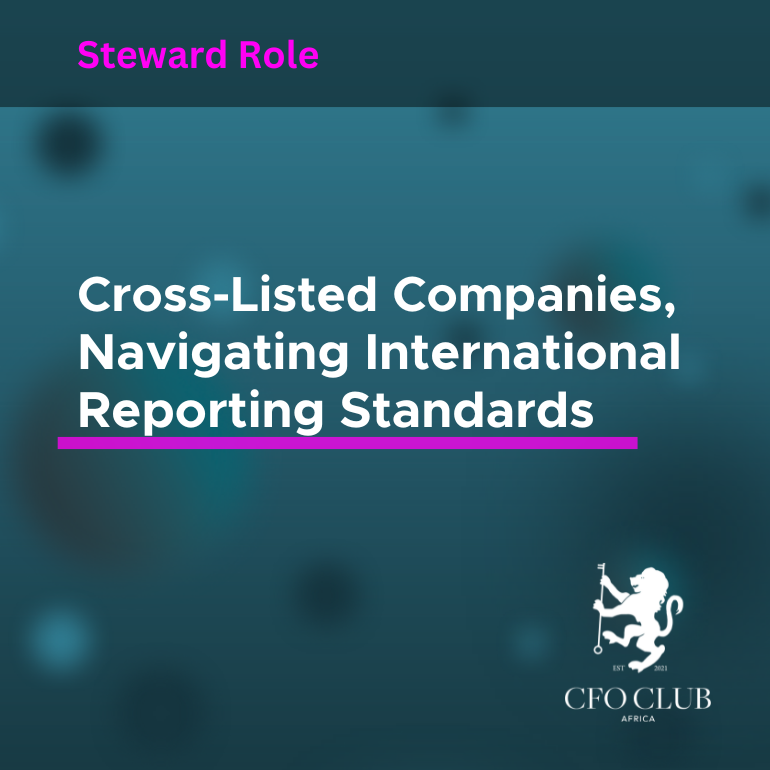Cross-Listed Companies, Navigating International Reporting Standards
You are running a business that’s performing well in South Africa. The next logical step might be to take your company to international markets by listing on a foreign stock exchange. Cross-listing opens doors to new opportunities—global investors, more capital, and enhanced brand recognition. But it also comes with a unique set of challenges, particularly for CFOs tasked with ensuring compliance with international reporting standards.
This isn’t just about ticking boxes for regulators; it’s about presenting your company’s financial health in a way that investors and stakeholders from different corners of the world can understand and trust. Let’s unpack what this means in practical terms.
Why Cross-Listing is a Double-Edged Sword
Cross-listing can be a game-changer for companies, but it’s not without its hurdles. By listing on both the Johannesburg Stock Exchange (JSE) and, say, the New York Stock Exchange (NYSE), your company gains access to a larger pool of investors. This can boost your share price and improve liquidity. However, it also means you’re suddenly subject to different reporting standards, timelines, and scrutiny levels.
For example, while South African companies follow International Financial Reporting Standards (IFRS), the US requires compliance with its Generally Accepted Accounting Principles (GAAP). These aren’t just different rulebooks—they reflect different philosophies. IFRS is principles-based and allows for some judgment in financial reporting, while GAAP is more rigid, rules-based, and less forgiving. As the CFO, you need to bridge these worlds effectively.
Understanding the Challenges
1. Balancing Different Standards
Let’s start with the most obvious challenge: reconciling IFRS and GAAP. You report revenue under IFRS, where recognition is tied to when performance obligations are satisfied. Under GAAP, the rules might require you to report differently based on stricter criteria. This can lead to two different figures for what should be the same revenue.
Another example is leases. Under IFRS 16, virtually all leases go on the balance sheet as liabilities. GAAP, however, has slightly different requirements for categorising and reporting leases. As a CFO, you’re not just preparing one financial report—you’re preparing two, and they need to align without creating confusion for your investors.
Invest in strong financial systems that allow for dual reporting. If your internal team isn’t equipped to handle the technicalities, bring in external advisors who specialise in cross-border compliance. This isn’t an area where you want to cut corners.
2. Juggling Multiple Deadlines
Each stock exchange has its own reporting calendar. For example, the JSE expects interim reports within three months after the financial period ends, while the NYSE might require quarterly reports on a tighter schedule. Missing a deadline isn’t just embarrassing; it can lead to penalties, delisting threats, or a loss of investor confidence.
Create a clear reporting timeline for all markets and set internal deadlines that are ahead of the official ones. This gives your team breathing room and ensures you don’t rush to meet critical deadlines. Modern project management tools can help track these timelines and keep everyone accountable.
3. Handling Currency Complexity
As a cross-listed company, your financial reports might be presented in multiple currencies, depending on the requirements of the exchanges. A strong rand in one period could make your results look better to South African investors, but weaker when converted to dollars for international markets.
This isn’t just an accounting challenge; it’s a storytelling challenge. How do you explain to investors why your profits appear strong in one currency but less so in another? Miscommunication here can lead to confusion or worse—a lack of trust.
Consider hedging strategies to reduce the impact of currency fluctuations. More importantly, provide clear explanations in your financial statements about how currency movements affect your results. This transparency goes a long way in building investor confidence.
Lessons for CFOs
Being a CFO for a cross-listed company is about more than just numbers; it’s about strategy. Here’s how you can rise to the challenge:
- Strengthen Your Team
Reporting across jurisdictions isn’t something one person can handle alone. Upskill your team in international reporting standards or bring in experts who can handle the nuances of both IFRS and GAAP. - Leverage Technology
Financial reporting software isn’t just a nice-to-have; it’s a necessity. These tools can automate complex reconciliations and streamline reporting processes, saving time and reducing errors. - Communicate Effectively
Don’t assume your investors or board members understand the intricacies of cross-border reporting. Use simple, plain language to explain the “why” behind your numbers. This builds trust and ensures everyone is on the same page. - Be Proactive with Regulators
Each market has its own regulatory quirks. For example, US regulators might demand detailed disclosures about revenue sources, while South African regulators could focus more on governance. Don’t wait for them to point out inconsistencies—stay ahead of the curve by maintaining open lines of communication.
Turning a Challenge into an Opportunity
Yes, cross-listing brings added complexity to your role as a CFO, but it also positions you as a key player in your company’s global journey. By mastering international reporting standards, you’re not just complying with rules—you’re building the credibility and transparency your company needs to thrive in competitive markets.
Remember, every set of financial statements tells a story. When you navigate these complexities successfully, you’re telling a story of growth, ambition, and capability—a story that resonates with investors worldwide.
Final Thought:
Cross-listing isn’t just a financial milestone; it’s a chance to elevate your company—and your career—on the global stage. With the right preparation, the challenges of international reporting can become steppingstones to success.

